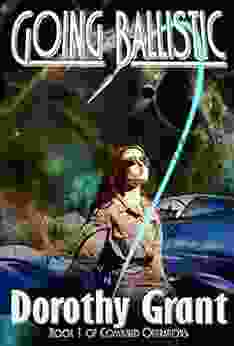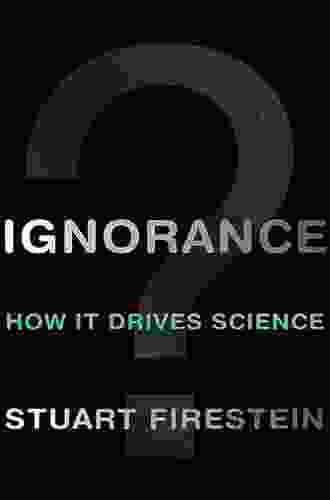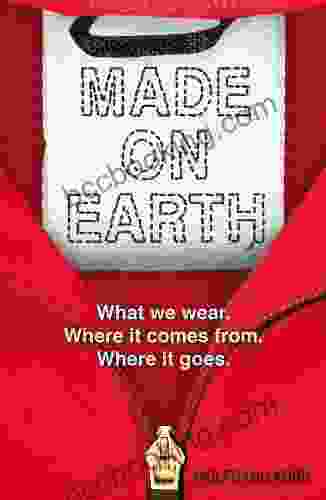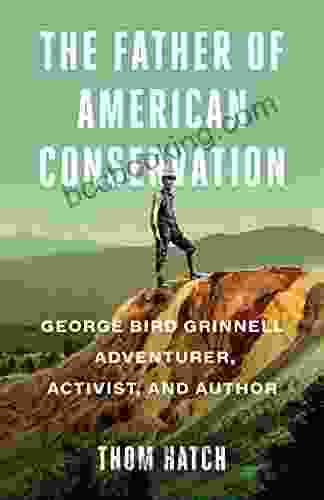Ignorance: How It Drives Science

Ignorance is not a lack of knowledge, but a lack of awareness of what you don't know. It is a powerful force that can drive scientific progress, but it can also lead to errors and misunderstandings.
4.4 out of 5
| Language | : | English |
| File size | : | 272 KB |
| Text-to-Speech | : | Enabled |
| Screen Reader | : | Supported |
| Enhanced typesetting | : | Enabled |
| Word Wise | : | Enabled |
| Print length | : | 208 pages |
| Lending | : | Enabled |
In this book, we will explore the nature of ignorance and its role in science. We will see how ignorance can drive scientific progress by leading scientists to new discoveries. We will also see how ignorance can lead to errors and misunderstandings, and how we can avoid these pitfalls.
The Nature of Ignorance
Ignorance is a state of not knowing. It can be either partial or complete. Partial ignorance is when you know something about a topic, but you don't know everything. Complete ignorance is when you know nothing about a topic.
Ignorance is often seen as a negative thing. It can make us feel stupid or embarrassed. However, ignorance can also be a valuable asset. It can lead us to new discoveries and help us to learn new things.
The Role of Ignorance in Science
Ignorance plays a vital role in science. It is what drives scientists to ask questions and to seek new knowledge. Without ignorance, there would be no scientific progress.
Here are some examples of how ignorance has driven scientific progress:
- The discovery of penicillin. Alexander Fleming discovered penicillin in 1928. He was studying bacteria when he noticed that a mold had contaminated his petri dish. The mold was producing a substance that was killing the bacteria. Fleming was ignorant of the fact that mold could produce antibiotics, but his ignorance led to the discovery of one of the most important drugs in medical history.
- The invention of the transistor. The transistor was invented in 1947 by John Bardeen, Walter Brattain, and William Shockley. They were working on a way to amplify electrical signals when they discovered that a small piece of semiconductor material could do the job. The transistor is now used in almost every electronic device.
- The discovery of the Higgs boson. The Higgs boson is a subatomic particle that was predicted by the Standard Model of particle physics. It was finally discovered in 2012 at the Large Hadron Collider at CERN. The discovery of the Higgs boson confirmed the Standard Model and was a major breakthrough in physics.
The Pitfalls of Ignorance
While ignorance can drive scientific progress, it can also lead to errors and misunderstandings. Here are some examples of how ignorance has led to scientific errors:
- The belief that the Earth is flat. For centuries, people believed that the Earth was flat. This belief was based on ignorance of the fact that the Earth is a sphere.
- The belief that disease is caused by evil spirits. For centuries, people believed that disease was caused by evil spirits. This belief was based on ignorance of the fact that disease is caused by germs.
- The belief that the universe is eternal. For centuries, people believed that the universe was eternal. This belief was based on ignorance of the fact that the universe is constantly expanding and cooling.
How to Avoid the Pitfalls of Ignorance
There are a few things that we can do to avoid the pitfalls of ignorance:
- Be aware of your own ignorance. The first step to avoiding the pitfalls of ignorance is to be aware of your own ignorance. This means knowing what you don't know.
- Be open to new ideas. One of the best ways to avoid the pitfalls of ignorance is to be open to new ideas. This means being willing to challenge your own beliefs and to consider new evidence.
- Be critical of information. When you encounter new information, be critical of it. Ask yourself if the information is credible and if it makes sense. Don't blindly accept everything that you hear or read.
Ignorance is a powerful force that can drive scientific progress, but it can also lead to errors and misunderstandings. By being aware of our own ignorance, being open to new ideas, and being critical of information, we can avoid the pitfalls of ignorance and harness its power to make progress.
4.4 out of 5
| Language | : | English |
| File size | : | 272 KB |
| Text-to-Speech | : | Enabled |
| Screen Reader | : | Supported |
| Enhanced typesetting | : | Enabled |
| Word Wise | : | Enabled |
| Print length | : | 208 pages |
| Lending | : | Enabled |
Do you want to contribute by writing guest posts on this blog?
Please contact us and send us a resume of previous articles that you have written.
 Book
Book Novel
Novel Page
Page Chapter
Chapter Text
Text Story
Story Genre
Genre Reader
Reader Library
Library Paperback
Paperback E-book
E-book Magazine
Magazine Newspaper
Newspaper Paragraph
Paragraph Sentence
Sentence Bookmark
Bookmark Shelf
Shelf Glossary
Glossary Bibliography
Bibliography Foreword
Foreword Preface
Preface Synopsis
Synopsis Annotation
Annotation Footnote
Footnote Manuscript
Manuscript Scroll
Scroll Codex
Codex Tome
Tome Bestseller
Bestseller Classics
Classics Library card
Library card Narrative
Narrative Biography
Biography Autobiography
Autobiography Memoir
Memoir Reference
Reference Encyclopedia
Encyclopedia Winston Churchill
Winston Churchill Jamie K Schmidt
Jamie K Schmidt Worley Faver
Worley Faver Kaitlyn Hill
Kaitlyn Hill Velody
Velody Tom Mccarthy
Tom Mccarthy Vivek Kamath
Vivek Kamath Stefanie Reinhold
Stefanie Reinhold Vito Tanzi
Vito Tanzi Tanya Marsh
Tanya Marsh Kalynn Bayron
Kalynn Bayron Shelly Crane
Shelly Crane Whitaker Ringwald
Whitaker Ringwald Theodore Sturgeon
Theodore Sturgeon Tamara Schenk
Tamara Schenk Grace Burrowes
Grace Burrowes Vinny Berry
Vinny Berry Philip P Massaro
Philip P Massaro Sheena Byrom
Sheena Byrom Stuart Tomlinson
Stuart Tomlinson
Light bulbAdvertise smarter! Our strategic ad space ensures maximum exposure. Reserve your spot today!
 Damon HayesFollow ·11.6k
Damon HayesFollow ·11.6k Tennessee WilliamsFollow ·16.4k
Tennessee WilliamsFollow ·16.4k Colin RichardsonFollow ·19.4k
Colin RichardsonFollow ·19.4k Osamu DazaiFollow ·8.8k
Osamu DazaiFollow ·8.8k Jedidiah HayesFollow ·13.8k
Jedidiah HayesFollow ·13.8k Michael SimmonsFollow ·3.4k
Michael SimmonsFollow ·3.4k Blake BellFollow ·3.6k
Blake BellFollow ·3.6k Raymond ParkerFollow ·12.5k
Raymond ParkerFollow ·12.5k

 Amir Simmons
Amir SimmonsImmerse Yourself in the Enchanting Realm of Nora Roberts'...
Prepare to be captivated by...

 Dan Henderson
Dan HendersonUnleash the Explosive Action of Going Ballistic Combined...
Prepare for an...

 Jeffery Bell
Jeffery BellDiscover the Controversial and Captivating "The Anarchist...
In the realm of literature, there are...

 Ryan Foster
Ryan FosterUnveiling Lincoln's Eloquence: How His Greatest Speeches...
In the annals of American...

 Jaime Mitchell
Jaime MitchellLove Radio Vinny Berry: A Journey of Heartbreak, Healing,...
Vinny Berry's...
4.4 out of 5
| Language | : | English |
| File size | : | 272 KB |
| Text-to-Speech | : | Enabled |
| Screen Reader | : | Supported |
| Enhanced typesetting | : | Enabled |
| Word Wise | : | Enabled |
| Print length | : | 208 pages |
| Lending | : | Enabled |














